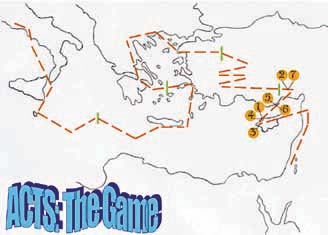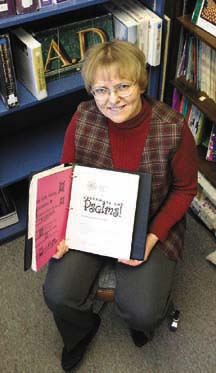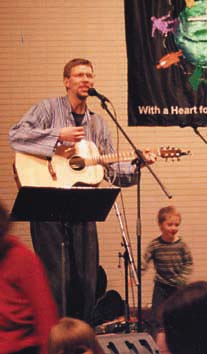Abbotsford, B.C.
Any teacher knows that engaging students who have grown up in a media-rich environment is a challenge, so imagine teaching the book of Acts to a class of 40 college students. This is the challenge faced by Gary Yamasaki, who has been teaching New Testament at Columbia Bible College (CBC) for 15 years.
 |
Gary Yamasaki created this game board to teach the book of Acts to first-year students at Columbia Bible College.
|
Yamasaki is a creative teacher who was thrilled when the audiovisual tech department built a media cart to house a DVD player, VCR, projector, speakers, etc. But he doesn’t limit his teaching to electronic gadgets; he is an engaging and dynamic speaker who uses lecture styles and storytelling.
Coming up with Acts: The Game was not a great stretch of Yamasaki’s imagination. At first he taught the course in a standard lecture format, but it occurred to him that the book of Acts would lend itself to a game format. A competitive person by nature, the game format would fit his style.
He developed a PowerPoint game board that shows a map with a starting line in Jerusalem and a finish line in Rome, with 60 spaces to navigate in between. The class is broken up into teams of five or six, created to ensure students aren’t working with people they already know.
“At one level, this is simply a precaution to prevent the formation of cliques within the teams,” he says. “At a more important level, however, I want this experience of working in a team to serve as training for the students in working with people they do not know—or perhaps even people they know but do not like—a skill so helpful for functioning in the real world.”
“Teamwork is huge for the game to be successful,” says Andrew Crosby, a student who took the class last year, reflecting humorously about his own experience. “I was part of a team where people didn’t even always show up; I still have some bitterness about that.”
Students earn points as a team and towards their individual mark. There are bonus markers on the map where each person scores one individual point. Points are also scored by individual pop quizzes based on daily readings, group quizzes, regular attendance and team challenges.
Another incentive for getting to Rome is a pizza party for any team that actually makes it. The members of the team that comes out ahead by the end of the course get their names engraved on a special Acts: The Game plaque.
Kent Thiessen took the class and enjoyed both the game and how it made him learn. “It teaches you that you have to do your readings every day, so it forces daily study,” he said. “I also learned a lot about the culture in that society, about the honour system that was going on.”
Last year Yamasaki presented the concept of Acts: The Game to a session of the American Academy of Religion/Society of Biblical Literature (SBL) convention, the largest gathering of religious scholars in North America. As a result of presenting Acts: The Game there, he has had inquiries from as far away as New Zealand.
“I felt honoured to have the opportunity to share my ideas with other Biblical studies professors, and I appreciated the opportunity to get feedback from them,” he said.
Perhaps the most satisfying comment comes from a student whose view of the book of Acts was changed because of the experience in Yamasaki’s class. “I really didn’t want to take [Acts] because I found the book to be long and boring. You made it come alive in your class…. You’ve cast the New Testament in a whole new and more understandable light.”
—Columbia Bible College release
Winnipeg, Man.
A young boy smashes into his father’s brand new car with a riding lawnmower and feels like an idiot. He attempts to recruit his sister to keep the accident a secret.
 |
| Elsie Rempel displays a draft copy of the new Vacation Bible School material produced by Mennonite Publishing Network. |
This is one scenario for discussion in the Vacation Bible School 2005 curriculum available from Mennonite Publishing Network (MPN), called “Celebrate the Psalms! Our God is Awesome.”
The curriculum dramas centre on two siblings who are spending a day cleaning up Grandma’s attic after she has passed away. They discover her old Bible, and out of boredom begin to read. They begin to identify with the story of David in the Psalms, finding that it has a remarkable connection to their own lives.
Project coordinator Eleanor Snyder, director of Faith & Life Resources for MPN, recommends the new study for Bible school, day camp, after-school programs or all-church retreats. “The Psalms are a wonderful source of inspiration for Mennonite Christians, both in times of joyful praise and in times of deepest despair,” Snyder says. “I encourage all our churches to take advantage of this rich Mennonite study resource that can nurture a lifetime of faith in our children.”
“Celebrate the Psalms!” introduces children to the God who creates and guides, forgives and blesses people from generation to generation. “Celebration Stations” provide art, drama, games and service activities to help children experience God. Each child will use a “Celebration Journal” containing a chart for reading the Psalms.
The curriculum is based on missional church thinking without using the word “missional,” according to Elsie Rempel, director of Christian Education and Nurture for Mennonite Church Canada. “‘Celebrate the Psalms’ works from the perspective that God is at work in a multitude of ways and places, and we want to join in with that work and celebrate it.”
Rempel read through a draft of the material last summer. “I am delighted to recommend this material to congregations,” she said. “The activities allow children to engage the truth and good news of the Bible in the creative and varied ways that children actually learn and relate to God. Best of all, this material is Bible-centred in a way that leads to abundant living with our God and God’s people.”
Sample materials and order information for “Celebrate the Psalms!” are available at
www.mph.org/vbs.
—MC Canada release by
Dan Dyck




